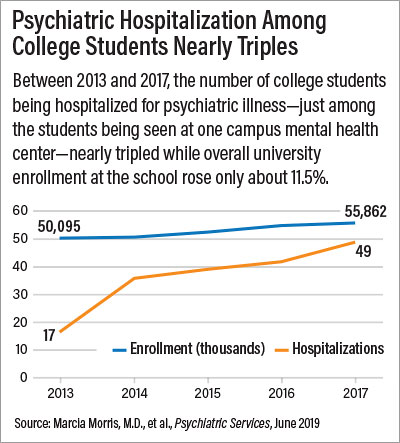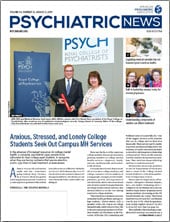Adam is 19 years old and studies night and day—sometimes going without sleep—because he is worried about his grades and losing his financial aid. Jennifer is 21 and expects to graduate with student loan debt in excess of $50,000. Michelle, an 18-year-old freshman, has over 750 Facebook friends and more than 1,000 Instagram followers, but she has no one with whom she feels comfortable confiding in.
These are the faces of the American college students who are presenting in growing numbers to college mental health services—depressed, lonely, anxious, and financially and academically stressed.
Certainly, that doesn’t characterize all or even most college students; and college continues to be, for millions of young people, a unique period of independence, growth, and expansion of one’s horizons. But recent research and anecdotal accounts from psychiatrists in college health centers indicate that mental illness is on the rise among America’s college students.
“There has been a dramatic increase in mental health problems among college students,” Marcia Morris, M.D., a member of the APA Caucus on College Mental Health, told Psychiatric News. She is the associate program director of Student Health Care Psychiatry at the University of Florida (UF) Counseling and Wellness Center in Gainesville, Fla. “One of the biggest stressors is for students who are in college and on their own financially. Their parents may be unable to provide any financial help, and so the students are under enormous pressure to do well or risk losing their scholarship or financial aid. These are the students I see who can have the most serious problems. They don’t have financial backup and have to perform in school.”
Morris is also an associate professor in the UF Department of Psychiatry and co-chair of the College Mental Health Task Force of the National Network of Depression Centers.
Morris and two Department of Psychiatry colleagues—Michael Shapiro, M.D., and Andres Pumariega, M.D.—compared UF enrollment data with the number of psychiatric hospitalizations among students presenting at the UF Student Health Care Center. They found that between 2013 and 2017, enrollment rose by just 11.5%, while hospitalizations nearly tripled—from 17 in 2013 to 49 in 2017 (see chart).
They published their findings as supplemental material accompanying a letter published in the June issue of Psychiatric Services. The three UF psychiatrists were responding to a report in the January issue of Psychiatric Services that found that among U.S. college students, the rate of treatment for a mental disorder increased from 19% in 2007 to 34% in 2017, while the percentage of students with lifetime diagnoses of mental conditions increased from 22% to 36%.
That study, by Sarah Ketchen Lipson, Ph.D., Ed.M., of Boston University School of Public Health, and colleagues also reported a decrease in mental health stigma among college students and speculated that diminishing stigma may be contributing to the rise in service utilization.
In their response, Morris, Shapiro, and Pumariega suggested that increases in the prevalence and severity of mental illness are more likely the culprits. They asserted that research data on mental health stigma among young people are mixed and that rates of stigma differ dramatically by geographic region.
In comments to Psychiatric News, Shapiro said, “Our data tell me that it’s not just more college kids asking for help; it’s more young people with mental illness going to college. What concerns me is that if we believe there is less stigma when there really is not and we don’t recognize the increasing severity of mental illness among our college students, then we are not going to deal with the real problem: How do we support more mentally ill college students?”
Shapiro, a child and adolescent psychiatrist, is not affiliated with the UF Counseling and Wellness Center but is affiliated with the university and sees a number of college students in his practice in the community.
“I have several patients who have become young adults that I have tried to follow since starting college,” he said. “Reading the article by Lipson and colleagues, I was not surprised to know that more college students were seeking mental health treatment. I continue to see kids who go to college because very often they are very reluctant to initiate treatment with a new professional at their school, but they still struggle with mental illness and the need for treatment.”
Meera Menon, M.D., co-chair of the APA Caucus on College Mental Health, said that as the acuity of the mental health needs of college students increases, so does the need for psychiatrists practicing within this field. The Caucus supports college psychiatrists in entering this field and is currently creating a mentorship program for medical students, residents, fellows, and early career psychiatrists to connect with more experienced college psychiatrists (see box).
Morris told Psychiatric News that in addition to academic and—especially—financial pressure, college students in the age of social media frequently lack real-life, real-time relationships. “A lot of 18-year-old students arrive at college for their freshman year thinking they will instantly make friends and find instead that they are very lonely,” she said.
Morris strongly urges parents to be advocates for their college students. Her book, The Campus Cure: A Parent’s Guide to Mental Health and Wellness for College Students, was published in 2018.
“I do a lot of education with parents around the idea that there are challenges in finding resources on or off campus,” Morris said. “I want parents to advocate for students, to recognize when they are having problems that require attention, and to encourage them to get help. And I always encourage my college-student patients to find some older adult in their life to provide that kind of support.”
She added, “In the end I would like to see more resources for treating mental illness among our college students, but in the absence of that, parents are the critical factor.” ■
“Increased Rates of Mental Health Service Utilization by U.S. College Students: 10-Year Population-Level Trends (2007–2017)” is posted
here. “Increased Rates of Mental Health Service Utilization by U.S. College Students” is posted
here.

